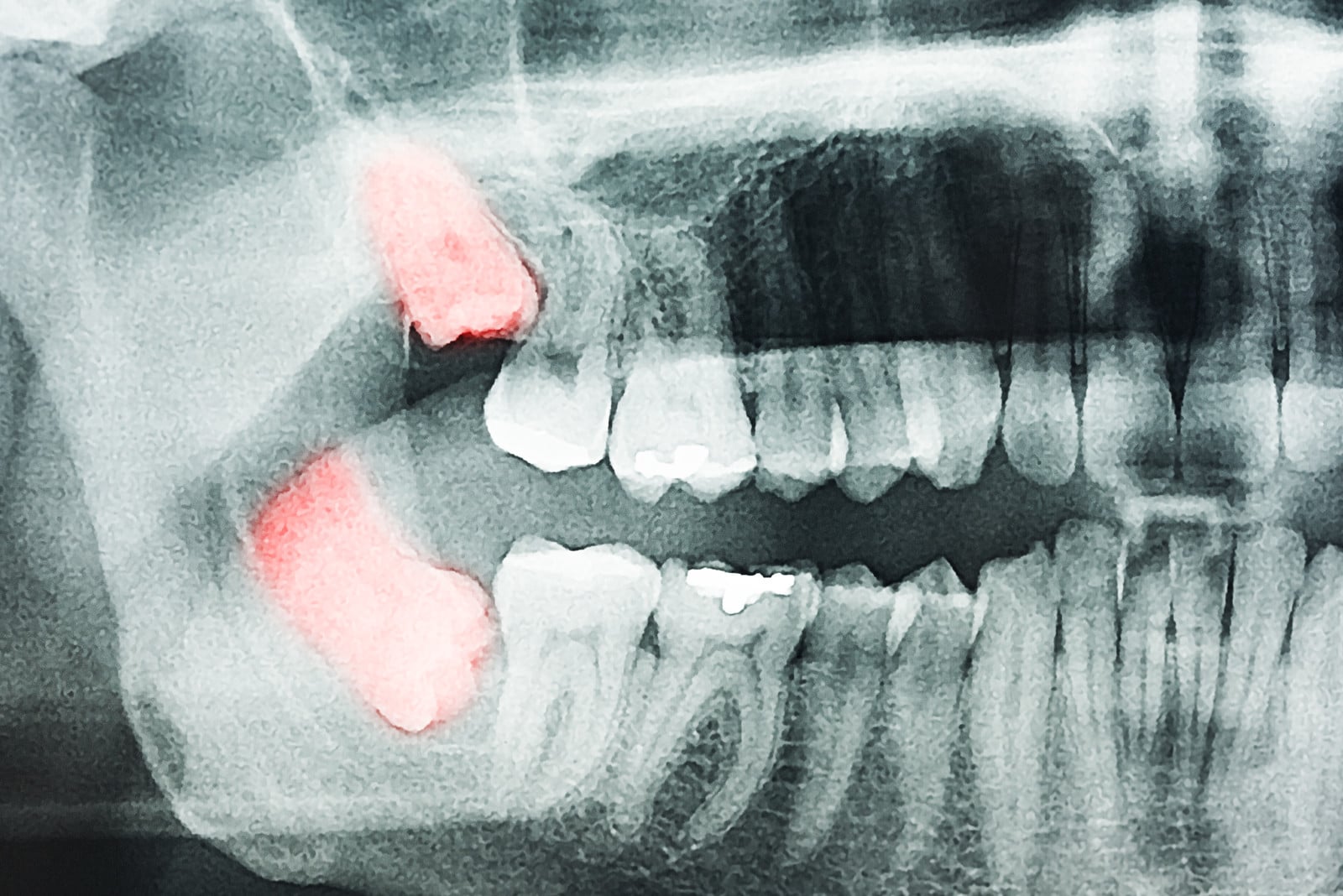The mouth is meant to open and close, even infants understand that concept. So it’s no surprise that it can be alarming when your jaw is tight and your mouth cannot open. The technical term is trismus, but the sensation is mild panic. After all, how are you supposed to eat, talk, and laugh with trismus?
In this article, we’ll talk about what is trismus, what causes it, and we’ll answer how long does trismus last.
What is Trismus
Plain and simple, trismus is an inability to fully open your mouth.
It can be a mild reduction in the range of motion or it could be a severe inability to open more than a few millimeters.
You may have also heard trismus called lockjaw. It’s not necessarily a disease, but rather a symptom or condition. During trismus, the muscles of the jaw become abnormally contracted which prevents the mouth from reaching full opening.
So what’s the normal amount of mouth opening?
Typically an opening of 35 millimeters, which is about the width of two fingers, is an average mouth opening.
At 35mm all foods can be eaten normally. When the mouth opening is less, the person starts feeling uncomfortable eating some foods. An adequate amount of space between the top and bottom teeth needs to exist to move food into the mouth.
Therefore, trismus is when the mouth opening is restricted to less than average. You can consider trismus as follows:
- Mild trismus = 20–30 mm
- Moderate trismus = 10–20 mm
- Severe trismus = less than 10 mm
Oh and in case you’re thirsty for more… you can learn more about trismus and lockjaw symptoms here.
What Problems Arise?
When the mouth is unable to open normally, there are some issues that arise that you normally would not think of.
Speaking becomes strained. The normal speech movement is disrupted and the muscles often fatigue easier while talking.
Oral hygiene can be compromised. A toothbrush or floss may be unable to adequately reach all parts of the mouth.
Eating may be inhibited. Certain foods may not easily fit in the mouth.
Digestive issues are common with trismus. Chewing is less efficient and swallowing is more difficult. The food enters the stomach less chewed which causes digestive strain. To help reduce stomach upset, be sure to eat softer foods and cut up your food into small pieces during symptoms of trismus. For great ideas of foods to eat you can check out here.
Trismus also has a psychological component. It’s normal to feel a slight panic when you feel like your mouth cannot open. Patients often have a sensation that feels similar to drowning or claustrophobia. It’s concerning but it’s a normal reflex. It’s important to try to stay calm and understand that the condition will pass. Practice breathing through your nose to help reduce the panic sensation.
What Causes Trismus?
Trismus can arise from a number of reasons and in varying degrees of severity. Let’s talk about the most common causes of trismus.
Trismus after wisdom tooth extraction

One of the most common symptoms after wisdom teeth extraction is limited mouth opening, particularly caused by the lower wisdom teeth.
Trismus after a wisdom tooth extraction is due to swelling. As the extraction sites heal, there is swelling and inflammation that resides around the muscles of the jaw. The swelling limits the space for the muscles to move which creates a tension and ultimately limits jaw motion for about 2 weeks. Oh and if you had a wisdom tooth extraction and want some tips to help heal you can check out here.
Trismus after dental injection
If you had a dental filling and ended up with limited mouth motion. It can be quite alarming. But before you go ballistic on your dentist, just know that trismus after a dental injection is a relatively common side effect. It doesn’t necessarily mean anything was done wrong and it usually resolves in about a week. The reason is because a dental injection has to pierce the muscles of the jaw to reach the area of the nerve, in doing so, the muscles can develop a bruise which creates a protective contraction reflex.
Temporomandibular Joint Disorder
Temporomandibular joint disorder or TMJ disorder for short is a complex condition that affects the head and neck. The condition is more than just a joint disorder. It can cause jaw tension, difficulty to chew, headaches, earaches, and general pain scattered throughout the head and neck. For more information you can check it out here. But one common symptom of TMJ disorder is also trismus and difficulty in opening the mouth.
Trauma
Trismus can also be caused by trauma such as a fall, car accident, or other injury. And the reason makes perfect sense. If you imagine a boxer getting punched in the jaw, the reason becomes more tangible. The swelling and trauma cause the muscles of the jaw to tense up in an effort to protect and repair the injury.
Tetanus
Nowadays with modern vaccines, tetanus is the least common condition to cause trismus, but its still possible. The condition is caused by bacteria which cause muscles all over the body, including the jaw, to painfully tighten.
How Long Does Trismus Last

The underlying cause of trismus usually dictates how long the condition will last. If the condition is caused by swelling or inflammation typically it will resolve in 1 to 2 weeks.
However, if the condition is caused by a chronic underlying condition such as TMJ disorder or arthritis of the jaw, the length of symptoms may be more variable depending on the success of treating the underlying cause.
How to Treat Trismus at Home
If you are sitting there frantically pouring through articles trying to treat your trismus at home, rest assured. Trismus is more commonly temporary than permanent. However, that doesn’t mean it should be allowed to progress.
Contact your doctor or dentist if your condition has been present for more than 48 hours or is progressing in severity. The earlier you start treatment, the easier it is to break the trismus. Here are some techniques you can do at home:
Gently stretch your jaw periodically
Just like all muscles, stretching is important in times of trismus. The key to understand is not to do too much all at once. Its better to favor consistently stretching gently over time, compared to doing too much all at once.
Simply open your jaw as much as you can and hold it periodically during the day. When you feel comfortable you can begin adding some resistance by putting your fingers on your top and bottom teeth and applying a gentle stretch.
Warm Compresses
Applying heat may seem like an ancient remedy but it can work wonders for muscle tension.
Simply warm up a small bowl of water in the microwave, check the temperature, and dab a facecloth in it to create a warm compress. Hold the compress against your jaw for 2 minutes and repeat as needed.
Medication
Your doctor may prescribe a medication such as a muscle relaxant, pain reliever, or anti-inflammatory medication. For over the counter medications you can try NSAIDs like ibuprofen as an option to help reduce inflammation and muscle tension.
Soft foods
Don’t overdo it for a few days. Give your jaw a break by shifting to softer foods to give it time to heal.
For some great recommendations of soft foods you can check out this article.
The Bottom Line
Yes, if you’re suffering from trismus, it can be scary. But although trismus can be painful and overwhelming, it usually is temporary. It often heals along with the underlying cause.
Speak with your doctor or dentist about your condition to confirm. Utilize the tips in this article for managing the symptoms.
And breathe. In many cases, trismus improves in 1 to 2 weeks.


